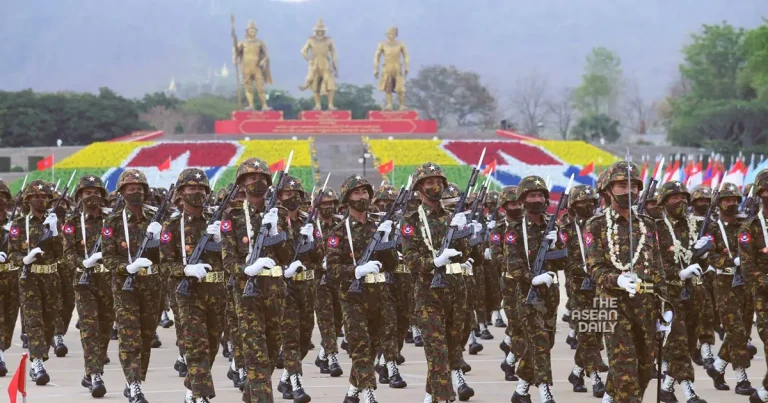22-3-2024 (YANGON) The Myanmar military junta has embarked on a nationwide conscription campaign, issuing summons letters to eligible civilians across the country. This initiative, rooted in the recently enacted conscription law, has ignited fears of brain drain and escalating violence amidst the ongoing crisis.
The summons letters, while lacking a standardised format, carry a uniform message – instructing recipients to register for military service and sternly warning that “failure to report will result in prosecution.” The law mandates that citizens aged 18 to 35, and in some cases up to 45, must serve in the armed forces.
One such recipient, a 31-year-old man named Kyaw, who requested anonymity, received his summons in mid-March, instructing him to report to his local township office. “The moment I learnt that my name was on the list, I knew I had to migrate. If I get enlisted, I will be doomed,” Kyaw said. “Everybody knows what would happen if you are conscripted. We are given the following choices: ‘Self sacrifice or flee’. I would rather be a beggar in a foreign land.”

Kyaw initially considered appealing for an exemption, citing his responsibility to care for his parents. However, he was informed that the appeals process could take months, during which he would still be summoned for service.
Another eligible enlistee, who attended the local administrative office’s call-up, recounted encountering around 40 individuals in a similar predicament. Approximately two-thirds of those who turned up were present, with seven being exempted, one of whom was reportedly diagnosed with tuberculosis.
In early February, the Myanmar army enacted the dormant enlistment law, citing the country’s Constitution, which states that every citizen has a duty to safeguard Myanmar’s independence, sovereignty, and territorial integrity. The first round of enlistment is slated to commence in April, with an estimated 5,000 recruits.
While women are currently exempted from service, the move has sparked widespread fear among eligible individuals. Opponents of the conscription law allege that the army plans to use civilian soldiers as human shields, a charge vehemently denied by the military.
Former army captain Kaung Thu Win warned that recruits are likely to be armed immediately upon graduating from bootcamp and sent to the frontlines. “The army will not assess a recruit’s progress thoroughly – such as the recruit’s skills or whether they are ready for war or not,” he cautioned. “The army’s training protocol is to instil fear in new recruits. For instance, if they’re ordered to line up, they will have to line up. They can only eat when it is time to eat. They can be dismissed only when given permission. No one would dare to go against the order because if someone disobeys it, he will be punished.”
Security experts have voiced concerns that conscription could further stoke the flames of violence in the country. The army and its opponents have been embroiled in ongoing conflicts since the coup.
Dr Min Zaw Oo, an executive director with the Myanmar Institute for Peace and Security, offered insights into the military’s approach to transforming civilians into fighters. “This is how military training works. We have to see how effective they could do that,” he remarked. Dr Min Zaw Oo added that on the battlefield, soldiers primarily care about two things – their comrades around them and avoiding being shot. “People fight because of the people around them. This is how the military training builds up comradeship,” he explained.
While the conscription law is considered a domestic issue for Myanmar, it has the potential to impact the broader region. Among the potential concerns is the possibility of desperate individuals seeking illegal means to flee the country, potentially crossing borders into neighbouring nations like Thailand.
As the military junta forges ahead with its controversial conscription drive, the nation holds its breath, bracing for the potential consequences of this divisive policy on the already volatile situation in Myanmar.




